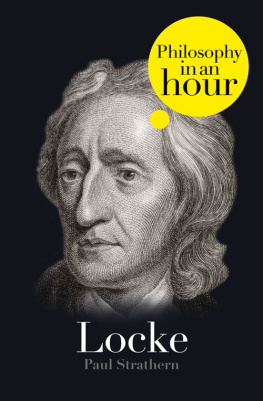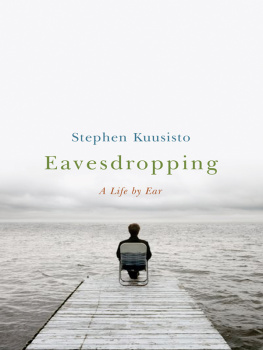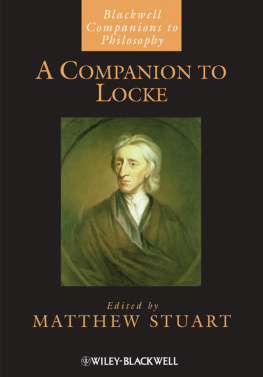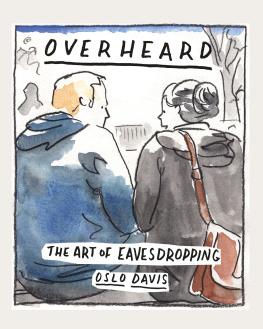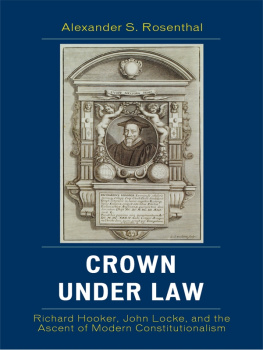EAVESDROPPING
We have only so much as to glance at another human being and we at once begin to read beneath the surface. We see there another conscious person, like ourselves. We see someone with human feelings, memories, desires. A mind potentially like ours.
NICHOLAS HUMPHREY
With the aid of a word I overhear in passing, I reconstruct an entire conversation, an entire existence. The inflection of a voice suffices for me to attach the name of a deadly sin to the man whom I have just jostled and whose profile I glimpsed.
VICTOR FOURNEL
Eavesdropping
AN INTIMATE HISTORY
JOHN L. LOCKE


Great Clarendon Street, Oxford OX2 6DP
Oxford University Press is a department of the University of Oxford.
It furthers the Universitys objective of excellence in research, scholarship,
and education by publishing worldwide in
Oxford New York
Auckland Cape Town Dar es Salaam Hong Kong Karachi
Kuala Lumpur Madrid Melbourne Mexico City Nairobi
New Delhi Shanghai Taipei Toronto
With offices in
Argentina Austria Brazil Chile Czech Republic France Greece
Guatemala Hungary Italy Japan Poland Portugal Singapore
South Korea Switzerland Thailand Turkey Ukraine Vietnam
Oxford is a registered trade mark of Oxford University Press
in the UK and in certain other countries
Published in the United States
by Oxford University Press Inc., New York
John L. Locke 2010
Crown copyright material is reproduced under
Class Licence Number CPOIP0000148 with the permission
of OPSI and the Queens Printer for Scotland.
The moral rights of the author have been asserted
Database right Oxford University Press (maker)
First published 2010
All rights reserved. No part of this publication may be reproduced,
stored in a retrieval system, or transmitted, in any form or by any means,
without the prior permission in writing of Oxford University Press,
or as expressly permitted by law, or under terms agreed with the appropriate
reprographics rights organization. Enquiries concerning reproduction
outside the scope of the above should be sent to the Rights Department,
Oxford University Press, at the address above
You must not circulate this book in any other binding or cover
and you must impose the same condition on any acquirer
British Library Cataloguing in Publication Data
Data available
Library of Congress Cataloging in Publication Data
Data available
Typeset by SPI Publisher Services, Pondicherry, India
Printed in Great Britian on acid-free paper by
Clays Ltd., St Ives plc
ISBN: 9780199236138
1 3 5 7 9 8 6 4 2
Contents
Chapter One
Passionate Spectators
Chapter Two
Under the Leaves
Chapter Three
Open-plan Living
Chapter Four
Reluctant Domestication
Chapter Five
Privacy, Intimacy, and The Selves
Chapter Six
Personal Power and Social Control
Chapter Seven
Passionate Exhibitors
Chapter Eight
What Will the Servants Say?
Chapter Nine
Virtual Eaves
Chapter Ten
Intimacy by Theft
Acknowledgments
IDID the research for this book at the University of Cambridge, New York University, and the City University of New York, completing the manuscript while I was on sabbatical in the Department of Anthropology at Yale University. I have enjoyed the encouragement and advice of several scholars and writers, including Michael Studdert-Kennedy, Kathrin Perutz, Alison Wray, Anne van Kleeck, and Kim Oller, though none has seen the final version of the manuscript. I have also received assistance on specific matters from a number of scholars, including Adrian Treves and Marjorie McIntosh. My greatest debt is to my wife, Catherine Flanagan, who has offered personal encouragement, editorial advice, and countless hours of thoughtful conversation. This book is dedicated to her.
JOHN L. LOCKE
Cambridge, England
Old Lyme, Connecticut
July 2009
List of Illustrations
Prologue
ON a flight from Milan to London I was slumped down in my aisle seat, deep in thought as I reviewed an early draft of the manuscript that has become this book. Unbeknownst to me, I was being watched by a woman in the middle seat of the row immediately in front. After we had landed and the passengers were commencing the customary disembarking ritual, the woman startled me by looking over her headrest and pointedly asking if I was writing a book. I answered that I was. Whats it about, she asked. I said my book concerned the intense desire of members of our species to know what is going on in the personal lives of others. At this, the woman burst into ironic laughter since first in watching, and then in asking, she had just expressed two different forms of that very desire.
Watching and asking produce a form of intimate experience, which can be enjoyable in its own right, as well as intimate images, which may be re-experienced when privately brought to mind oras informationshared with others. Intimacies tend to circulate preferentially among people who know and trust each other, and they usually move swiftly. Since many of these secrets ultimately become public knowledge, a look at how intimate material travels enables us to understand the social foundations of scandal, rough justice, and the news, even history.
I smiled in response to the lady on the plane but I could just as well have laughed, too, for here I was, writing a book about a subject on which there was little in the way of directly relevant research. Indeed, until I began to study eavesdroppingone of the more important ways that ordinary people express the desire at issueI had never, in many years of research, encountered a behavior whose actual significance was so greatly at variance with its recognized importance. Look for books on social behavior with the word eavesdropping in the index section and you are likely to be severely disappointed. Enter the same word in computerized literature searches and your screen will display a list of books on wiretapping and other forms of electronic surveillance. But the word was coined centuries before telephones and recording equipment were invented, and the practice of eavesdropping documented nearly a thousand years earlier, when people were happy to entrust to unaided senses the question of who was doing what to whom.
Just after I began my studies of eavesdropping, a colleague asked me why I had chosen to address this particular subject. It must have seemed a radical departure from my previous work on the psychology of language. I told him that I had come across Marjorie McIntoshs analysis of court records indicating that five and six centuries ago, English citizens had, in impressive numbers, been arrested for eavesdropping. I wondered what, in the medieval mind, would have caused this behavior to be criminalized, and what the criminals themselves were doing, or thought they were doing, when they went out at night and listened to their neighbors conversations.
I had also begun to study ethology, a field that deals with behavior in a broad range of species, and had encountered the work of Peter McGregor. He pointed out that birds increase their chances of survival by monitoring the long-distance calls of other birdssignals that are not even intended for their ears. Such interceptions, McGregor noted, are ignored by all existing models of animal communication, which are uniformly dyadic, that is, focused exclusively upon two partiesthe sender and the receiver. These models contain no provision for any
Next page


